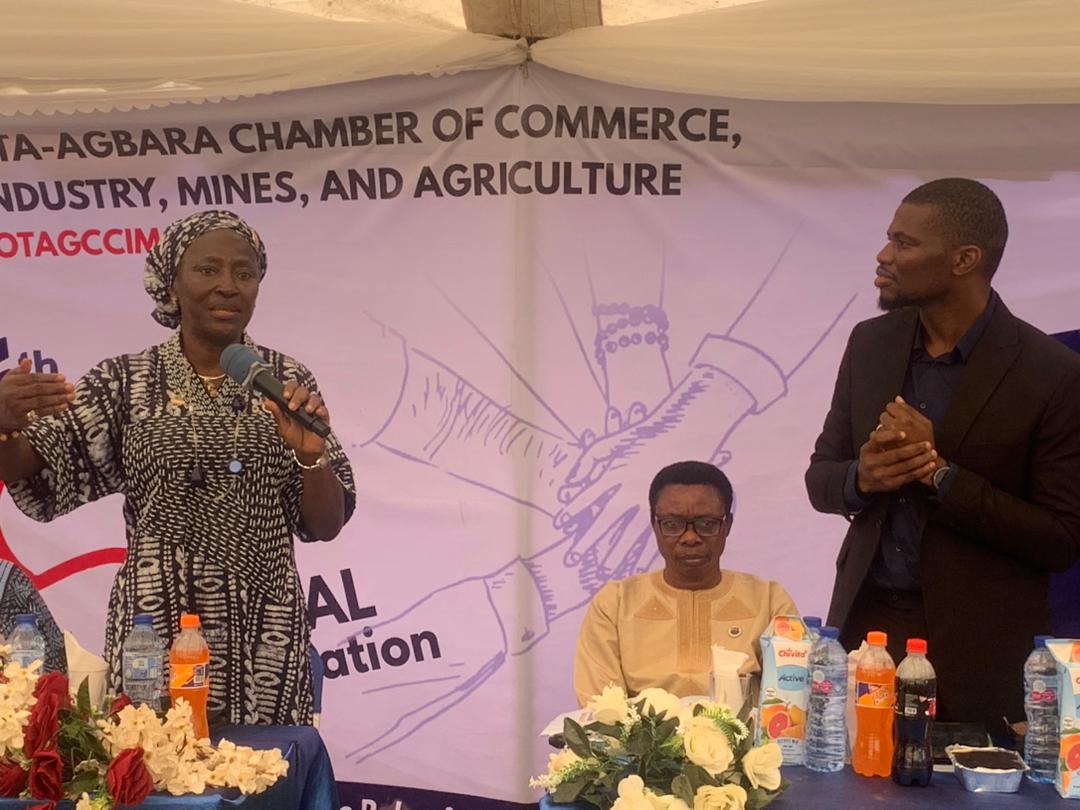A speech I gave as Guest Speaker at the 10th Annual General Meeting of the Ota-Agbara Chamber of Commerce, Industry, Mines and Agriculture (OTAGCCIMA), Thursday, 28th September 2023
Ladies and gentlemen, esteemed members of the Ota-Agbara Chamber of Commerce, Industry, Mines and Agriculture (OTAGCCIMA), and distinguished guests, I am truly honored to stand before you today on this auspicious occasion—the 10th Annual General Meeting and the inauguration of new executives of OTAGCCIMA. As we gather here, we celebrate not just a decade of progress and achievements but also a fresh beginning—a new chapter in the remarkable story of Ota-Agbara.
Today, our focus will be on the pivotal role that OTAGCCIMA plays in synergizing the Organized Private Sector (OPS) within our vibrant community and beyond. We shall delve deep into the multifaceted functions of this chamber, the challenges we face, and the opportunities that lie ahead as we continue to champion the interests of our local businesses and strengthen the economic fabric of Ota-Agbara and its environs
Before we delve into the critical role that Chambers of Commerce play in Nigeria, it’s essential to understand what the Organized Private Sector represents. The Organized Private Sector, or OPS, is the collective representation of private businesses and enterprises within our nation. It spans a broad spectrum, from small startups and local enterprises to large corporations with international reach. It forms the backbone of our economy, and its success is intertwined with the prosperity of our nation.
It might seem a paradox to talk of an Organized Private Sector, when businesses within the private sector often compete with each other for resources, market share, and customers. However, the concept of collaboration within the private sector is not necessarily paradoxical; rather, it reflects the recognition of common interests and shared challenges that businesses face, as well as the benefits that can result from cooperation.
While competition is a fundamental aspect of the private sector, businesses also recognize that there are situations where cooperation can lead to mutual benefits and contribute to the overall growth and stability of the business ecosystem. As a result, private-sector organizations and associations often work to strike a balance between competition and collaboration to achieve their collective goals and address common challenges. This is where the Chambers of Commerce come in.
Historically, Chambers of Commerce have played a pivotal role in supporting businesses, fostering collaboration, and influencing policy decisions. As you may be aware, In Nigeria, the journey of the Chambers of Commerce movement dates back to the late 1800s with the establishment of the Lagos Chamber of Commerce and Industry. Over time, these chambers have evolved into dynamic entities that champion the interests of the private sector. In a rapidly evolving global economy, adaptability and knowledge are paramount. Chambers help businesses stay informed about economic trends and market research, enabling us to make informed decisions and remain competitive.
This brings us to the current economic realities of our country, Nigeria. While our nation has made progress in various socio-economic aspects, we cannot overlook the formidable challenges that persist. Our economy continues to grapple with the heavy reliance on oil exports for revenues, exposing us to the volatile fluctuations in global oil prices. Moreover, addressing infrastructure gaps, fostering stronger institutions, and grappling with governance issues remain pressing concerns. Income and opportunity inequalities are notably high, contributing to the persistent issue of poverty, regional disparities, and social unrest. The daunting task of job creation and combating high inflation adds to the complexity of our economic landscape. Additionally, we must contend with the escalating climate risks, with extreme weather events adding to food production challenges and impacting the well-being of our citizens. In the face of these multifaceted challenges, Nigeria stands at a critical juncture, requiring comprehensive and concerted efforts to chart a path towards a more inclusive, diversified, and resilient economy.
In this demanding economic landscape, the Organized Private Sector (OPS) of Nigeria emerges as a beacon of hope and a formidable force for change. The OPS, encompassing a wide spectrum of businesses, holds the potential to be a catalyst for resolving the multifaceted challenges facing our nation’s economy. Through entrepreneurship, innovation, and resilience, the private sector has the power to diversify revenue sources, reduce our over-reliance on oil, and create jobs—addressing the core issue of unemployment. The OPS can play a pivotal role in fostering regional development and mitigating income inequalities by investing in various sectors and creating opportunities for marginalized communities. By championing corporate social responsibility initiatives, ethical business practices, and sustainable growth strategies, the private sector can contribute not only to economic development but also to social and environmental well-being. The OPS’s engagement in advocacy, collaboration, and partnership with government bodies can lead to the implementation of policies that support a conducive business environment, further stimulating growth. Thus, the organized private sector in Nigeria holds the key to unlocking our nation’s full economic potential and steering us towards a brighter and more prosperous future.
However, our journey toward synergy in the OPS is not without hurdles. Chambers of Commerce in Nigeria face challenges like funding constraints, regulatory hurdles, and the need for greater inclusivity. While these challenges are real, they are also opportunities for growth and innovation. Addressing them collectively is the key to strengthening the OPS.
In charting the way forward, there are several recommendations to consider. Firstly, the Organized Private Sector (OPS) can intensify its efforts to diversify the economy by investing in non-oil sectors such as agriculture, manufacturing, and technology. These sectors hold the potential for job creation, increased export opportunities, and reduced dependence on oil revenues. Secondly, the OPS can engage in skill development and vocational training programs to equip the Nigerian workforce with the expertise required for modern industries, thus enhancing productivity and competitiveness. Thirdly, promoting ethical business practices, transparency, and corporate governance within the private sector can help attract foreign investment and boost investor confidence. Moreover, the OPS can advocate for policies that prioritize infrastructure development, including power, transportation, and digital connectivity, to address critical bottlenecks in our economy. Lastly, the private sector’s active involvement in initiatives that promote environmental sustainability and social responsibility can foster inclusive growth and improve the overall well-being of our nation. Through these practical steps and a shared commitment to our country’s progress, the OPS can contribute significantly to overcoming the economic challenges that Nigeria faces.
The Ota-Agbara Chamber of Commerce, Industry, Mines and Agriculture (OTAGCCIMA) can set the tone and take the lead within the Organized Private Sector (OPS) by serving as proactive facilitators and catalysts for change. Firstly, by strengthening advocacy and engaging with government institutions to promote policies that foster a conducive business environment. Secondly, OTAGCCIMA can initiate and nurture collaborations among businesses, creating platforms for networking, knowledge sharing, and the exchange of best practices. Furthermore, Chambers can champion programs focused on business development, entrepreneurship, and skill enhancement, helping OPS members adapt to changing market dynamics and emerging opportunities. By offering a wide array of services, including market research, mentorship programs, and access to financing, Chambers can empower businesses to thrive and expand.
In conclusion, the role of Chambers of Commerce in Nigeria is instrumental in synergizing the Organized Private Sector. They serve as a bridge between businesses, advocating for favorable policies, facilitating collaboration, and providing valuable resources. While challenges exist, these challenges present opportunities for growth and innovation.
I would like to extend my heartfelt congratulations to the newly elected President and Executives of the Ota-Agbara Chamber of Commerce, Industry, Mines and Agriculture (OTAGCCIMA). Your election marks not only a momentous occasion for our Chamber but also a significant turning point in our collective journey toward a more prosperous and efficient Organized Private Sector (OPS) in Ota-Agbara and its surrounding areas. As you assume your leadership roles, I urge you to wholeheartedly embrace the initiatives listed above, focusing on advocacy, collaboration, business support, and ethical practices. Your dedication to these principles will undoubtedly be instrumental in steering our OPS toward greater effectiveness and efficiency, fostering economic growth, and addressing the multifaceted challenges that lie ahead. I have every confidence in your ability to lead with vision, integrity, and unwavering commitment, and I look forward to witnessing the positive impact you will undoubtedly bring to our vibrant business community. Together, we can shape a brighter future for Ota-Agbara and Nigeria as a whole.
The path ahead may not always be smooth, but together, through the collective efforts of businesses and Chambers of Commerce, we can overcome obstacles and build a more prosperous future for our nation. Let us continue to work together, share ideas, and embrace collaboration as we strive for a stronger, more dynamic Organized Private Sector in Nigeria.
Thank you for your attention, and may the spirit of collaboration and synergy guide us on our journey to economic prosperity.

